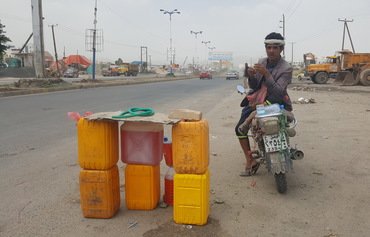ADEN -- At one time, Fouad al-Wadei sold only honey at his Sanaa store. These days, however, with the decline in the honey trade amid the ongoing war in Yemen, he has no choice but to sell other commodities, such as perfumes and natural oils.
Al-Wadei, who is in his 40s and used to export honey to the United Arab Emirates (UAE) and Malaysia, said the war, landmines and climate change have restricted the movement of beekeepers.
This has led to a decrease in honey production, he told Al-Mashareq.
Logging in Amran, Saada and Hajjah provinces has also reduced the number of trees and affected the diversity of plants on which bees feed. The best honey comes from the flowers of the Sidr and Elb trees.
![A honey seller shows a customer various types of Yemeni honey in a Sanaa honey shop in June. [Haitham Mohammed/Al-Mashareq]](/cnmi_am/images/2023/06/26/42448-yemen_honey_2-600_384.jpg)
A honey seller shows a customer various types of Yemeni honey in a Sanaa honey shop in June. [Haitham Mohammed/Al-Mashareq]
![A honey seller prepares a customer's order in his shop in Sanaa in June. [Haitham Mohammed/Al-Mashareq]](/cnmi_am/images/2023/06/26/42449-yemen_honey_3-600_384.jpg)
A honey seller prepares a customer's order in his shop in Sanaa in June. [Haitham Mohammed/Al-Mashareq]
This has previously happened in the Usaimat region, famous for its high-quality honey, al-Wadei said.
On the other hand, he said, the war has caused unemployment for many Yemenis and a decline in income for others, which has affected their purchasing power.
To make things more complicated, he said, transporting honey between provinces is challenging as some are controlled by the Iran-backed Houthi group and others by the legitimate government.
Damaged reputation
Fateh Nasr, a Sanaa-based honey trader in his 30s, said the Houthis have damaged the reputation of the honey produced in areas under their control, including Sanaa and neighbouring provinces.
The honey produced in Houthi-controlled areas is now worse as the militia's focus on imposing taxes and fees has affected the production process.
Low-grade honey is mixed with better honey and sold on the market, he explained.
Meanwhile, in government-controlled areas such as Hadramaut, the production of honey has not been affected as much -- despite climate change -- because the regions where honey is produced are far from the Houthis, he said.
However, the transport and marketing processes have been affected by the restricted movement between the provinces, he told Al-Mashareq.
Nasr said he is concerned about the continued challenges that honey merchants and beekeepers face, including the Houthi imposed taxes and fees -- at times in the name of zakat -- all of which affect the production of honey.
According to United Nations (UN) figures, there are about 100,000 Yemeni households engaged in beekeeping and dependent on it as their sole source of income.
In late May, the UN Food and Agriculture Organisation (FAO) warned about the impact of climate change and other practices that kill bees on the production of honey in Yemen.
The honey production process, it said, is also affected by the difficulties of moving beehives between pastures due to the Houthis' landmines and checkpoints, and the high fuel prices.
Effects on food security
Abdullah Nasher, who teaches agriculture at Sanaa University, said, "There are various kinds of Yemeni honey because of the topographic diversity that provides for natural, botanical, and terrain diversity."
"You may travel for 10 hours between regions in another country to see the same kinds of plants, while in Yemen there is a great plant diversity in all regions, which provides an abundance of different flowers that bees feed on."
Climate change has had an effect on honey production because it has affected the length of tree-planting seasons, he said.
These changes confuse beekeepers, as the time to collect honey is different now from previous years, and this may affect timely marketing, he told Al-Mashareq.
Additionally, imports of adulterated honey and its mixing with local honey have harmed the reputation of Yemeni honey, Nasher said.
Damage to the honey sector directly affects the country's food security and the economy in general, economist Abdul Aziz Thabet said.
Thabet called for "facilitating the movement of beekeepers in various regions, increasing safety measures in ports and markets, and banning tree logging in areas that serve as pastures for bees".

![The honey trade is attractive to young residents of Yemen because of its high yields. A man in his 20s sells honey in a shop owned by his older brother in the Hadda residential area of Sanaa province in June. [Haitham Mohammed/Al-Mashareq]](/cnmi_am/images/2023/06/26/42447-yemen_honey_1-600_384.jpg)






